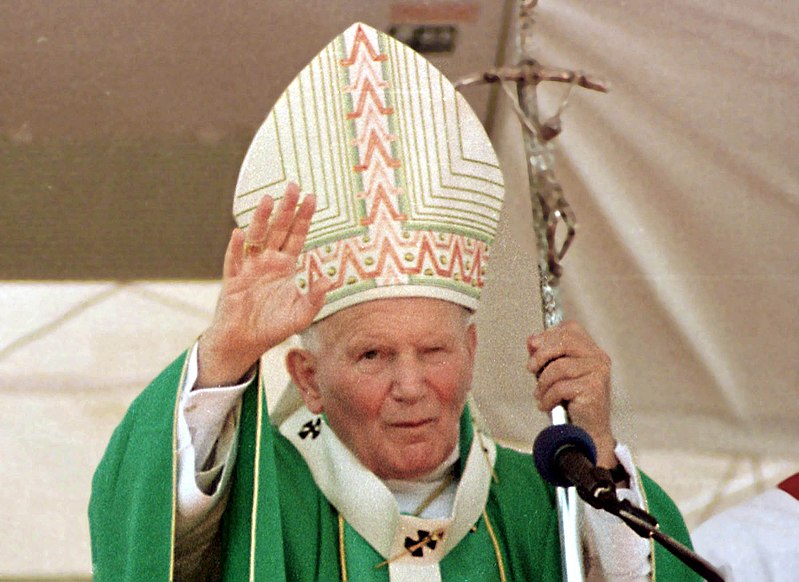The departed Pope’s vision of an alternative globalization should challenge narrow debate about “moral values.”
Published in Foreign Policy In Focus and Asia Times.
A steady feature in Pope John Paul II’s obituaries has been mention of his unwaveringly conservative stances on issues such as abortion, birth control, gay rights, and the ordination of women. While these positions were sources of consternation for many American Catholics, they far from represent the whole of John Paul’s ethical beliefs. Particularly in his teachings about the global economy, the Pope advanced a vision of social justice that challenges narrow political debate about “moral values.”
Many commentators have highlighted the Pope extensive travels throughout the world and his use of advanced telecommunications to spread his message. Less noted is the fact John Paul’s vision of globalization sharply countered the pro-corporate triumphalism spread by “free trade” boosters.
Reflecting on the process of globalization during his 1998 visit to Cuba, the Pope contended that world is “witnessing the resurgence of a certain capitalist neoliberalism which subordinates the human person to blind market forces.” He claimed that “[f]rom its centers of power, such neoliberalism often places unbearable burdens upon less favored countries.” And he remarked with concern that “at times, unsustainable economic programs are imposed on nations as a condition for further assistance.”
Coming at a moment when protests against the type of “structural adjustment” mandated by the U.S.-dominated World Bank and International Monetary Fund were beginning to make headlines, the targets of John Paul’s condemnation were not mysterious. Because of such economic policies, the Pope argued, we “see a small number of countries growing exceedingly rich at the cost of the increasing impoverishment of a great number of other countries; as a result the wealthy grow ever wealthier, while the poor grow ever poorer.”
John Paul elaborated his arguments in his 1999 exhortation, Ecclesia in America. There he asserted that the increasing global integration of the current era presents an opportunity for progress. “However,” he warned, “if globalization is ruled merely by the laws of the market applied to suit the powerful, the consequences cannot but be negative.” He spoke out against “unfair competition which puts the poor nations in a situation of ever increasing inferiority.”
The Pope’s sentiments reflected the church’s wider understanding of political economy. In a 2001 address to the Pontifical Academy of Social Sciences, John Paul reiterated the faith’s teaching that “[e]thics demands that systems be attuned to the needs of man, and not that man be sacrificed for the sake of the system.” Furthering this idea, the Pope insisted on “the inalienable value of the human person” who “must always be an end and not a means, a subject, not an object, not a commodity of trade.”
John Paul also pointed toward an alternative to the vision of market fundamentalism that is “based on a purely economic conception of man” and “considers profit and the law of the market as its only parameters.” He contended that “solidarity too must become globalized.”
When he received members of the European Automobile Manufacturers Association in 2001, he called for “ethical discernment aimed at protecting the environment and promoting the full human development of millions of men and women, in a way that respects every individual’s dignity and makes room for personal creativity in the workplace.”
Most specifically, the Pope strongly supported the Jubilee 2000 coalition’s call for thorough-going debt relief for developing countries. He stated in 1998 that “the heavy burden of external debt… compromises the economies of whole peoples and hinders their social and political progress.”
“If the aim is globalization without marginalization, we can no longer tolerate a world in which there live side by side the immensely rich and the miserably poor, the have-nots deprived even of essentials and people who thoughtlessly waste what others so desperately need. Such contrasts are an affront to the dignity of the human person.”
The Pope’s economic teachings were consistent with his views of political life. John Paul is rightly remembered for championing the democratic rights of people in his native Poland and elsewhere behind the Iron Curtain. Some US neoconservatives have sought to distort this legacy by presenting the Pope as an intellectual sidekick to Ronald Reagan. But John Paul’s conception of democracy was not one of unchecked individual rights. Rather, he asserted that free citizens must have “a firm and persevering determination to commit [themselves] to the common good.”
In this regard, John Paul operated within the moral precedent set in the Second Vatican Council’s statement on The Church in the Modern World. Here the church argued that “the state has the duty to prevent people from abusing their private property to the detriment of the common good. By its nature private property has a social dimension which is based on the law of the common destination of earthly goods. Whenever the social aspect is forgotten, ownership can often become the object of greed and a source of serious disorder.”
Many observers have speculated that the next Pope may be the first to come from the global South. While sharing John Paul’s social conservatism, several of the most prominent candidates from the developing world (including Latin American Archbishops Jorge Mario Bergoglio of Buenos Aires, Argentina, Andrés Rodríguez Maradiaga of Tegucigalpa, Honduras, and Claudio Hummes of Sao Paulo, Brazil) also hold in common with the departed pontiff an outspoken concern for global economic justice.
It is far from certain that one of these candidates will become the next Pope. Nevertheless, John Paul’s economic ethics represent a legacy that will continue as an important current within the Catholic Church—and that should give pause to anyone who believes moral values are the exclusive province of the right.
__________
Research assistance for this article provided by Jason Rowe. Photo credit: José Cruz/Abr, Wikimedia Commons.
